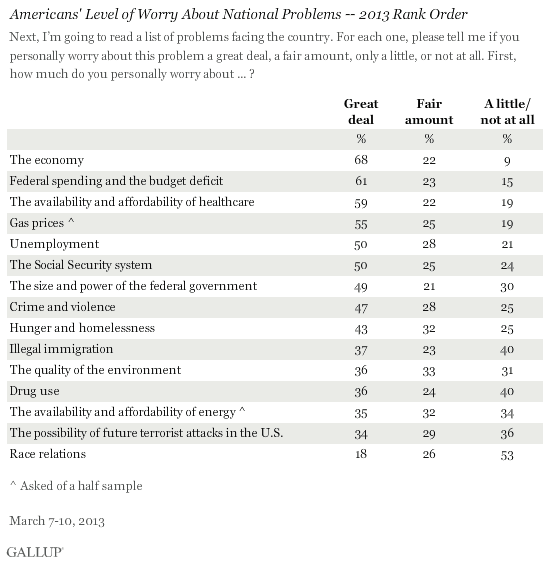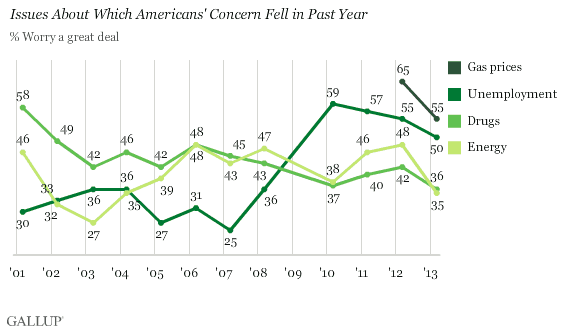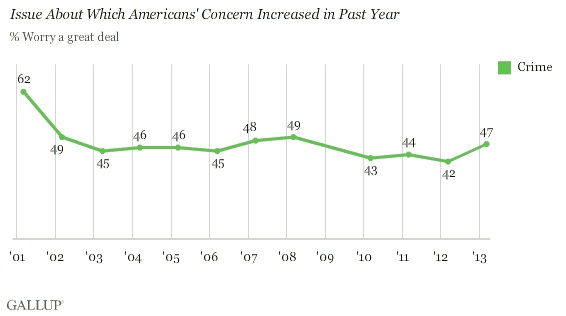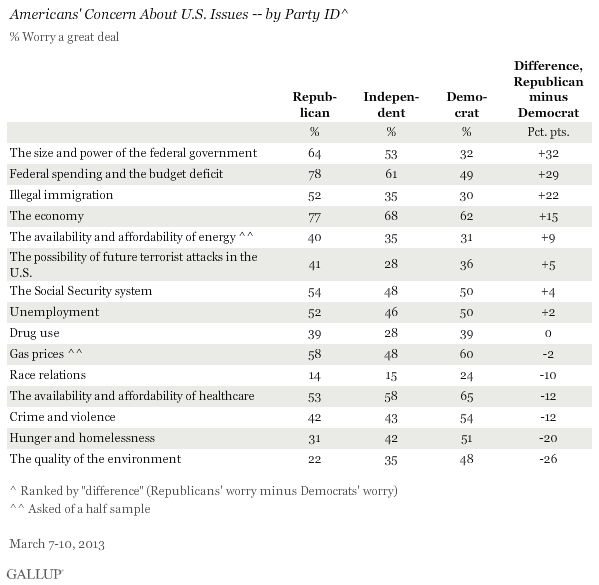PRINCETON, NJ -- Americans' prime worries when it comes to the nation's problems today are the economy, followed by federal spending/the deficit, healthcare, and gas prices. Majorities of Americans report worrying "a great deal" about each of these, ranging from 68% for the economy to 55% for gas prices. Additionally, 50% worry a great deal about unemployment and Social Security.

Each March, Gallup measures Americans' concern about various problems facing the country as part of its annual Environment survey, conducted March 7-10 this year. More than half of Americans worry at least a fair amount about all of the issues except race relations. However, extreme worry -- those saying they worry "a great deal" about the problem -- extends from 68% at the high end to 18%, for race relations, at the low end.
Other low-ranking issues include the possibility of future terrorism in the U.S., the availability and affordability of energy, drug use, the quality of the environment, and illegal immigration. Fewer than four in 10 Americans say they worry "a great deal" about each of these.
Three issues in the middle of the list -- the size and power of the federal government, crime and violence, and hunger and homelessness -- are highly concerning to between 43% and 49% of Americans.
Energy Loses Some Steam as a Public Concern
The biggest shift in worry recorded this year is a 13-point drop, from 48% to 35%, in the percentage of Americans saying they worry a great deal about the availability and affordability of energy. Relatedly, there has been a 10-point drop, from 65% to 55%, in worry about gas prices. Although average gas prices in the U.S. today were roughly the same at the time of this year's survey as they were in March 2012, last year's poll followed a major speech in February by President Barack Obama, addressing the nation's energy policy amid rising gas prices, thus drawing attention to the issue.
Concern about unemployment has ticked down in each of the past three years, including a five-point drop this year to 50%. Nevertheless, unemployment remains a much more significant source of anxiety for Americans than it was from 2001 to 2008, when no more than 36% were highly worried about it.
Concern about drug use dipped six points this year to 36%, putting concern about drugs at one of the lower points Gallup has recorded since 2001.

Only for crime did public concern rise by at least five points this year, possibly reflecting the nation's focus on gun violence since the tragic Newtown, Conn., school shooting in December. However, the five-point increase to 47% still puts concern about crime in the fairly narrow 42% to 49% range seen since 2002. Concern was significantly higher (62%) in Gallup's pre-9/11 reading in 2001.

Americans' level of concern toward the remaining 10 issues tested this year is essentially unchanged. These include the economy, healthcare, hunger and homelessness, the environment, terrorism, the federal budget deficit and spending, race relations, Social Security, illegal immigration, and the size and power of the federal government.
Partisans See Many Problems Differently
The ratings for several issues are characterized by significant partisan differences. Chiefly, Republicans are more likely than Democrats to say they worry a great deal about the size and power of the federal government, federal spending/the budget deficit, illegal immigration, and the economy. Democrats are more likely than Republicans to worry about the environment, hunger and homelessness, crime, healthcare, and race relations.

Independents' level of concern for most issues is similar to the national averages, or about halfway between Republicans' and Democrats' concern. However, independents are less likely than both Democrats and Republicans to indicate concern about terrorism and drug use.
Bottom Line
The economy is the undisputed top problem Americans worry most about, mirroring its ranking in Americans' open-ended responses to Gallup's monthly measure of the most important problem facing the country. The economy has ranked as the top public concern on this annual Environment poll rating each year since 2008 (excluding 2009, when Gallup didn't ask the question). Prior to that, healthcare was the top-ranking issue; and while this has dropped in rank in recent years, the percentage saying they worry a great deal about it has not. Thus, while the economy dominates public consciousness today, healthcare might be seen as the issue of the new millennium, positioned as a top-tier concern both before and since major healthcare policy changes were passed as part of the Affordable Care Act in 2010.
Recent increases in gas prices are evident in the high percentage of Americans continuing to say they worry a great deal about this, while, with little high-profile activity on energy policy by the president or others in Washington, the broader issue of "energy" garners much less concern.
Survey Methods
Results for this Gallup poll are based on telephone interviews conducted March 7-10, 2013, with a random sample of 1,022 adults, aged 18 and older, living in all 50 U.S. states and the District of Columbia.
For results based on the total sample of national adults, one can say with 95% confidence that the maximum margin of sampling error is ±4 percentage points.
Interviews are conducted with respondents on landline telephones and cellular phones, with interviews conducted in Spanish for respondents who are primarily Spanish-speaking. Each sample of national adults includes a minimum quota of 50% cellphone respondents and 50% landline respondents, with additional minimum quotas by region. Landline telephone numbers are chosen at random among listed telephone numbers. Cellphones numbers are selected using random digit dial methods. Landline respondents are chosen at random within each household on the basis of which member had the most recent birthday.
Samples are weighted to correct for unequal selection probability, nonresponse, and double coverage of landline and cell users in the two sampling frames. They are also weighted to match the national demographics of gender, age, race, Hispanic ethnicity, education, region, population density, and phone status (cellphone only/landline only/both, cellphone mostly, and having an unlisted landline number). Demographic weighting targets are based on the March 2012 Current Population Survey figures for the aged 18 and older U.S. population. Phone status targets are based on the July-December 2011 National Health Interview Survey. Population density targets are based on the 2010 census. All reported margins of sampling error include the computed design effects for weighting.
In addition to sampling error, question wording and practical difficulties in conducting surveys can introduce error or bias into the findings of public opinion polls.
For more details on Gallup's polling methodology, visit www.gallup.com.
